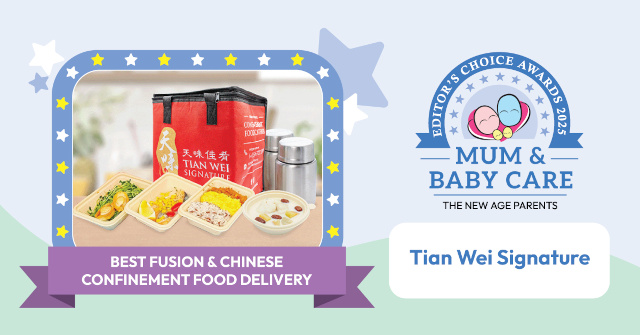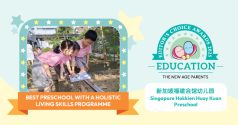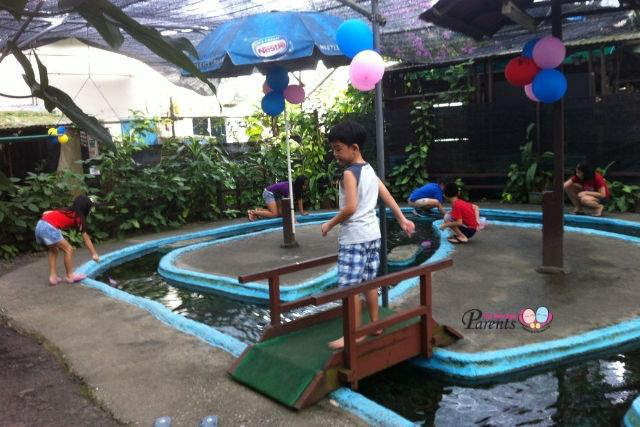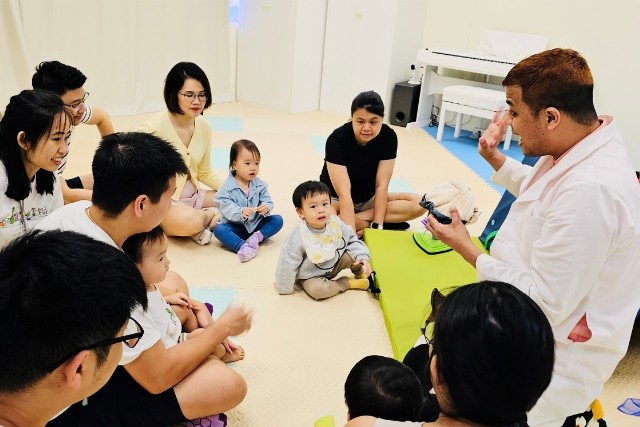 We had an interview with Mr Mohammed Ali Bin Mahmood, Senior Director, PPIS Social Services & Training and Consultancy, PPIS Jurong Family Service Centre to find out more about the survey that was done on the Family Values that Singaporeans have today. Through the interview, we realized that the traditional values namely (a) Love, care and Concern (b) Communication (c) Filial Responsibility (d) Mutual Respect (e) Commitment has been successfully passed down from the elder generation. Many Singaporean responded very positively to family values and results have indicated more than 80 percent feels that all 5 values are important.
We had an interview with Mr Mohammed Ali Bin Mahmood, Senior Director, PPIS Social Services & Training and Consultancy, PPIS Jurong Family Service Centre to find out more about the survey that was done on the Family Values that Singaporeans have today. Through the interview, we realized that the traditional values namely (a) Love, care and Concern (b) Communication (c) Filial Responsibility (d) Mutual Respect (e) Commitment has been successfully passed down from the elder generation. Many Singaporean responded very positively to family values and results have indicated more than 80 percent feels that all 5 values are important.
Family Values
1) The New Age Parents is concerned that in many years to come; the importance of 5 values will shift and change due to the modernizing and growing generations. How will these values differ? Namely (a) Love, care and Concern (b) communication(c) Filial Responsibility (d) Mutual Respect (e) Commitment.
The National Family Council embarked on a Family Values Survey to find out if 5 core family values (outlined in 1993) were still cherished by families.
The survey, conducted early this year, yielded several positive findings. First, we found that Singaporeans still placed a high priority on their families and cherish all 5 family values mentioned. In particular, we were pleasantly surprised that the values mentioned by Singaporeans, when unprompted, were similar to those mooted in 1993, almost 20 years ago. This reflects a certain timelessness of the values, as well as shared values amongst our different generations.
We were also happy to note that there were not many significant differences in values held by older and younger Singaporeans. This suggests that family values have been successfully transmitted over time from our elders to the young.
I feel that if Singaporeans continue to nurture a family first culture, we will be able to sustain the future generation’s priority to lead their lives according to positive family values.
2) Of all of the above 5 values stated, which is to you the most important value to be focusing on currently and why?
We found that:
– love, care and concern is the top most important family value;
– family members are communicating with each other; and
– filial responsibility is still strong.
We also found that while commitment is still relevant, it could be under strain.
Although 43% of respondents disagreed that divorce is the best solution when a couple cannot seem to work out marital conflicts, a high 34% agreed with the statement, while 23% remained neutral.
Further, while 40% of the respondents felt that divorce is not justifiable, 44% were neutral and 15% said that divorce could be justifiable, especially among respondents who were younger and better educated.
These figures suggest that there might be still a significant portion (likely more than half) of Singaporeans who are likely to feel that divorce is an acceptable way out of marriage when things do not work out. We feel that if individuals are open to a way “out” of marriage, their level of commitment to their spouses might also be undermined.
Hence, I feel that there is scope to build on the value of commitment to marriages.
3) Marriage is a very important issue to a family. Divorce cases in modern society increased greatly and are deemed common. Is divorce the only way to solve marriage issue? Who is suitable to divorce in this case?
 I feel that a divorce is a serious matter, with social and economic penalties not just on the divorcing couple, but on children as well if the couple have children. While marriages and divorces are private matters, what the National Family Council could do is to help strengthen relationships. Marriage Central, set up by the NFC, has organised the Real Love Works campaign annually to celebrate marriages, Marriage Convention to impart skills and tips to sustain healthy marriages, as well as a website including Facebook and twitter to help engage couples to connect emotionally. There are many other initiatives by Marriage Central. We urge you to visit our website to find out more.
I feel that a divorce is a serious matter, with social and economic penalties not just on the divorcing couple, but on children as well if the couple have children. While marriages and divorces are private matters, what the National Family Council could do is to help strengthen relationships. Marriage Central, set up by the NFC, has organised the Real Love Works campaign annually to celebrate marriages, Marriage Convention to impart skills and tips to sustain healthy marriages, as well as a website including Facebook and twitter to help engage couples to connect emotionally. There are many other initiatives by Marriage Central. We urge you to visit our website to find out more.
4) As shown in the survey, love, concern and care comes first as the most important value. Spending time with family is a good way of showing concern. How much time spend is good enough, and how can we define quality time?
I think it is hard to put a number on what is enough or quality time to be spent on our families, as we each have different schedules and the kids too have different school and social schedules, depending on their age. We all also need to spend time with our parents.
Personally, I put in effort to ensure that some time in the day and week are spent with my family. Meal times, for instance is a very important family time for me. I always make it a point to have dinner together everyday. That is the best time to exchange news of what each member has done during the day. My kids are 12 and 15 and listening to them relate the happenings in school alone can be both amusing and enriching for me. Also, listening to how they assess situations that their friends are going through or just listening to their thoughts about issues helped my wife and I gauge if they have imbibed the values we found important that we want to pass on.
5) How is love and concern being shown in the modern way? Is there any unique and fun method that modern population used? Is it a good or bad trend?
We held discussions with small groups prior to the survey, and people shared that their families were more expressive in showing their love than previous generations. For e.g., many, particularly those younger or middle-aged, will hug, kiss and say “ I love you” to their loved ones. Older Singaporeans tend to show their care and concern through actions such as cooking their child’s favourite dish. I think the act of showing love, be it verbal or physical or through actions are important, and that it is important for each one of us to cherish our families in loving ways as often as possible.
Filial Responsibility
6) Compared to the past generation, is it true that filial piety and responsibility is decreasing due to globalization and constantly westernization of our thoughts?
The survey findings reflected that filial responsibility in Singapore is still strong. 98% of the respondents believed that children should regularly spend time and provide financial support to their elderly parents. Majority of the respondents would not consider putting their parents into an old age/nursing home because children should look after their parents. A high 93% felt that one must always love and respect his parents, regardless of the parent’s qualities and faults.
7) Is it true that western countries do not value as much filial responsibility as compared to Asia country like Singapore where most people are Asian.
The survey did not compare its findings with western countries.
I would be cautious to say that filial responsibility is an Asian value or that Westerners are not responsible to their parents. I think different cultures show respect in different ways and also have different expectations from their children.
8) On local television, an advertisement on filial responsibility is played. This advertisement show how one generation will affect the other generation. Also to mention, Jack Neo’s Money not enough movie series also sent us a number of message regarding filial responsibility. Is media an impactful tool to bring awareness across the nation, what in your view is to be done other than media driven awareness efforts?
The filial piety TVC is on a subject-matter that is inter-generational and it seeks to heighten public awareness on the value of filial piety with the focus on “how one generation loves, the next generation learns”.
We hope Singaporeans will be inspired to recognise the need to lead by example and to do the morally right thing for their parents. By doing the right thing, it is hoped that children will emulate their parents, and in turn care for them when they grow old.
Indeed, the media is a powerful tool. I think that that advertisement on filial piety were successful in having people think and talk more about filial responsibility and family values. Within a mere few days after the launch of the TVC, myfilialpiety facebook received 15,000 “fans” indicating that they “like” the campaign and the viral has spread very rapidly. Beyond raising awareness, which the Council has done, we need action, and I think you will agree that each of us have to play our part to care for our respective families.
9) Back to Filial responsibilities. In the survey, it was shown that it is still strong. However we still could see many homeless elderly sleeping at bus-stop, HDB shelters or even on the street. Many earned from collection cardboard and drinks can to survive. Is the survey result still justifiable in such aspect?
Yes, anecdotal evidence shows that there are our seniors who are struggling to make ends meet. Each situation is unique. While the survey found that majority Singaporeans in general value filial responsibility, I think there will still be instances of children who neglect their parents.
10) Technology enhanced communication with method such as sms and email. It does no doubt improved communication. However, many said that it lost a touch of personal warmth. Is technology a bonus or a threat to family communication?
I think depending on how and when we use technology to communicate, it can either be a boon or a threat. With all forms of technology, be it TV, or SMS, MSN, blogs, twitter and Facebook, we can use technology to help us communicate better, or be trapped in unhealthy habits, for e.g. if we spend all our time communicating via technology and lack face-to-face interaction. So it really depends on our self- awareness, self-discipline and level of commitment to our families.
We thank you for your time and hope to work with you again.
* * * * *
Like what you see here? Get parenting tips and stories straight to your inbox! Join our mailing list here.
Want to be heard 👂 and seen 👀 by over 100,000 parents in Singapore? We can help! Leave your contact here and we’ll be in touch.















































